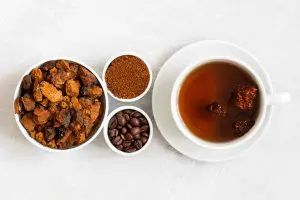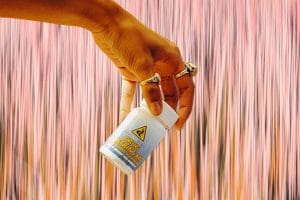While psychedelics today are paraded as groundbreaking therapy tools for the treatment of various chronic ailments, from PTSD to addiction to depression, one need not be suffering in order to reap the benefits of a psychedelic. Indeed, in the 1990s, researcher Bob Jesse articulated the notion that psychedelics could be used for the “betterment of well people.”
And the evidence is there: In this study, for instance, researchers Katherine MacLean, Matthew Johnson, and Roland Griffiths looked at the effects of psilocybin on healthy, “hallucinogen-naive” participants—i.e. people who had never tried psychedelics before. They found significant increases in the “openness” personality trait in the group of participants who had “complete mystical experiences” during their high-dose psilocybin sessions. The term “openness” refers to being “permeable to new ideas and experiences” and being “motivated to enlarge [one’s] experience into novel territory,” and the trait is associated both with creativity and with fluid, flexible thinking. The researchers defined “complete mystical experience” as an experience characterized by sufficiently intense feelings of “unity,” “transcendence of time and space,” “ineffability and paradoxicality,” “sacredness,” “noetic quality,” and “positive mood,” as measured by participants’ responses to the “States of Consciousness Questionnaire.” The participants’ increases in openness “remained significantly higher than baseline” more than one year after the high-dose psilocybin sessions. According to MacLean et al., this is the first time that research has demonstrated “changes in personality in healthy adults after an experimentally manipulated discrete event.”
This is quite a remarkable finding, and it may represent an important development in western society’s relationship with psychedelics, and with self-improvement more generally.
Throughout history and across the globe, healthy human beings have tried various measures to change themselves for the better. For example, someone might engage in a training or diet regimen to cultivate their physical fitness and athletic abilities; or they might try meditative or contemplative practices to become more mindful, compassionate, and grounded.
However, most of the means we have for self-improvement must be used consistently for an extended period of time in order to produce beneficial effects—or, in the case of a psychoactive substance, we must be acutely under the influence in order to experience their benefits. In other words, most of these tools do not create changes by initiating a single “discrete event,” and instead require ongoing maintenance/repetition over time—with each use creating transient, rather than lasting changes (e.g. taking Modafinil to temporarily improve cognitive abilities).
The research conducted by MacLean et al. suggests that psilocybin – when administered within an appropriately structured, supportive, guided context – could be used to initiate a single “discrete event” (the “complete mystical experience”) that produces an enduring change in personality (an increase in “openness”). And this in and of itself is a means of “human enhancement,” or simply “enhancement”—the practice of using some means to improve a physical or mental capacity above “normal” or healthy levels. Enhancement is distinguished from therapy in that therapy is by definition aimed at fixing or treating a disorder, disability, or deficiency, whereas enhancement is by definition aimed at making healthy people “better” than they were before. While tools such as exercise and meditation can be used for enhancement purposes, much of the conversation about human enhancement (primarily in the bioethics literature) focuses on the use of existing, emerging, or speculative technologies (e.g. pharmacological agents or drugs, neural implants, genetic engineering, and more.).
While psychedelic therapy is a major topic of discussion these days in both the media and within the scientific and medical establishments, there is much less talk about psychedelic enhancement. This makes sense because we tend to prioritize treating the unwell over improving the wellness of healthy people—especially since focusing on the potential of psychedelics as medicine has shown itself to be a successful way for legitimizing these substances within mainstream society, and because psychedelic therapy shows promise as a uniquely effective treatment for a number of serious ailments that trouble significant portions of the population. One might expect to see the legalization of psychedelic therapy long before the legalization of psychedelic enhancement—which in other words would equate to legalizing or decriminalizing psychedelics for non-therapeutic or even “recreational” purposes.
How to Grow Shrooms Bundle
Take Both of Our Courses and Save $90!
Read: Why More Therapists Need to Learn About Psychedelics—Now
A few jurisdictions have already begun to do this, however. In November 2020, Oregon voters approved the Oregon Psilocybin Services Act. While the public narrative surrounding this new policy has focused on it as legalizing “psilocybin therapy” or “medical psilocybin” for the “treatment” of conditions like trauma and depression, the name of the law provides a clue as to the truth of the matter: It’s called the Psilocybin Services Act, not the Psilocybin Therapy Act. To that end, “services” could be interpreted as an umbrella term including not just therapy, but also enhancement.
Indeed, the text of the Psilocybin Services Act outright states that psilocybin can be used for enhancement purposes: In Section 8, the text states that the Oregon Health Authority “may not require a client to be diagnosed with or have any particular medical condition as a condition to being provided psilocybin services.” Therefore, according to the language, ‘well’ people may also access psilocybin services, and the OHA (Oregon Health Authority) is explicitly prohibited from implementing restrictions that would exclude these individuals.
In addition, Tom and Sheri Eckert, the chief petitioners of the Psilocybin Services Act, have said in interviews that the law is intended to legalize the administration of psilocybin as a means of “personal development,” for “enhanc[ing] a general sense of well-being, openness, creativity, and spiritual connectedness,” rather than only as a treatment for mental health issues.
In order to see what legalized psychedelic enhancement will look like in Oregon, we will need to wait until the end of the “two-year program development period,” when the OHA implements a regulatory system recommended by the Oregon Psilocybin Advisory Board, and begins issuing psilocybin service facilitator and psilocybin service center licenses. But, especially if Oregon’s psilocybin service legalization model proves to be successful, other states and/or localities may be inspired to implement similar laws, paving the way for more widespread access to legal psychedelic enhancement. Many are seeing that psychedelics can be used as tools for promoting human flourishing in a broad sense, rather than only as medicines for treating the unwell.
Tom Eckert himself appears to hold a perspective of this sort. In a blog post written before the Psilocybin Services Act had passed, he claimed that our society is experiencing a “crisis of consciousness,” and that contemporary forces have disposed us to “forget our inner dimensions, our inner resources, ourselves, [and] our deeply felt self-acceptance.” He argued that there is a great need for fundamental “transformation,” for society to embark on a “journey towards wholeness.” Eckert then concluded that “an intelligently regulated psilocybin service framework” might offer us an opportunity for “social catharsis,” “healing the culture,” and “reclaiming our consciousness” by making available “safe and effective means to enhance and explore consciousness.”
Some activists and legislators, who otherwise seem to share Eckert’s enthusiasm about the transformative potential of psychedelics, are pushing for legalization models that would include far, far fewer regulations than are included in the Psilocybin Services Act. Legalized psychedelic enhancement would look very different under these models than it will in Oregon, and some of the models have been gathering steam recently.
For example, the California State Senate will soon vote on SB-519, a bill proposed by Senator Scott Wiener that would, among other things, “make lawful” the “social sharing” of a variety of psychedelic substances, “including in the context of group counseling, spiritual guidance, community-based healing, or related services,” but without implementing any regulations on this activity beyond the prohibitions against “knowingly” sharing with minors. The bill would make it legal for individuals to give the substances out for the recipients to use however and wherever they please, and for individuals to offer guided psychedelic administration sessions to members of the public, without any licensing, training, or code of ethics.
If the current version of SB-519 becomes law, Californians would then have much more freedom to legally use psychedelics for enhancement purposes than Oregonians will once their new law goes into effect after a two-year program development period. However, there is a trade-off here: While legalization models with fewer restrictions allow for greater liberty, they also sacrifice opportunities both for taking measures to mitigate dangers and for implementing evidence-based ‘best practice’ rules to promote positive outcomes. In other words, while less regulation means that people are more able to freely use psychedelics in the ways that they choose for themselves, it is through regulation that we can ensure that psychedelics may only legally be used in ways that are safe and effective (relying on evidence from the scientific research to determine rules for the safe and effective use of psychedelics). For example, the research has established that taking psychedelics can trigger psychotic breaks in people who have histories of/predispositions to psychotic disorders; thus, we have scientific evidence indicating that giving psychedelics to people without first screening them for contraindications is an unsafe practice (the Psilocybin Services Act mandates that all clients pass a safety screening before receiving psilocybin).
Read: The Campaign to Decriminalize Naturally Occurring Psychedelics
Could legalized psychedelic enhancement help transform society for the better? The answer to this question depends in part on which particular legalization proposals are eventually passed in different jurisdictions, and what actually happens on the ground in those jurisdictions after the models have been implemented. We will see what the future has in store for us.

DoubleBlind is a trusted resource for news, evidence-based education, and reporting on psychedelics. We work with leading medical professionals, scientific researchers, journalists, mycologists, indigenous stewards, and cultural pioneers. Read about our editorial policy and fact-checking process here.

DoubleBlind Magazine does not encourage or condone any illegal activities, including but not limited to the use of illegal substances. We do not provide mental health, clinical, or medical services. We are not a substitute for medical, psychological, or psychiatric diagnosis, treatment, or advice. If you are in a crisis or if you or any other person may be in danger or experiencing a mental health emergency, immediately call 911 or your local emergency resources. If you are considering suicide, please call 988 to connect with the National Suicide Prevention Lifeline.



